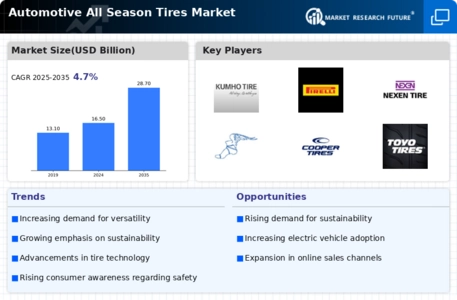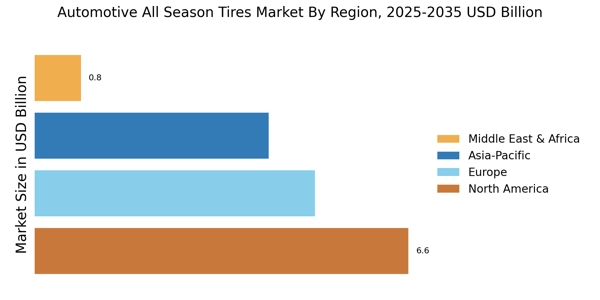Increasing Vehicle Ownership
The rise in vehicle ownership across various regions appears to be a pivotal driver for the Automotive All Season Tires Market. As more individuals acquire vehicles, the demand for tires that can perform well in diverse weather conditions intensifies. This trend is particularly evident in emerging markets, where vehicle ownership rates have surged. According to recent data, the number of registered vehicles has increased significantly, leading to a corresponding rise in tire sales. All season tires, known for their adaptability, are becoming the preferred choice among consumers seeking convenience and cost-effectiveness. This growing vehicle ownership trend is likely to bolster the Automotive All Season Tires Market, as consumers prioritize tires that offer reliable performance year-round.
Growing Awareness of Environmental Impact
The growing awareness of environmental impact is influencing consumer choices in the Automotive All Season Tires Market. As sustainability becomes a priority for many consumers, there is a noticeable shift towards eco-friendly tire options. All season tires, which often utilize sustainable materials and manufacturing processes, are gaining traction among environmentally conscious consumers. Market data indicates that a significant percentage of consumers are willing to pay a premium for tires that align with their values regarding sustainability. This trend suggests that the Automotive All Season Tires Market may see an increase in demand for all season tires that not only perform well but also contribute to reducing the carbon footprint.
Regulatory Support for Tire Safety Standards
Regulatory support for tire safety standards is emerging as a key driver in the Automotive All Season Tires Market. Governments worldwide are implementing stringent regulations to ensure tire safety and performance, which directly impacts consumer confidence. All season tires that meet or exceed these safety standards are likely to gain a competitive edge in the market. Recent data indicates that compliance with safety regulations can enhance brand reputation and consumer trust, leading to increased sales. As regulatory bodies continue to emphasize the importance of tire safety, the Automotive All Season Tires Market may experience growth as manufacturers adapt to these standards and consumers prioritize safety in their purchasing decisions.
Consumer Preference for Cost-Effective Solutions
In the Automotive All Season Tires Market, consumer preference for cost-effective solutions is increasingly shaping purchasing decisions. Many vehicle owners are seeking tires that provide value without compromising safety and performance. All season tires, which eliminate the need for seasonal tire changes, present a financially viable option for consumers. Market data indicates that the average consumer spends a considerable amount on tire maintenance annually, and the adoption of all season tires can potentially reduce these costs. This shift in consumer behavior suggests that the Automotive All Season Tires Market may experience growth as more individuals recognize the long-term savings associated with all season tires, thereby driving demand.
Technological Advancements in Tire Manufacturing
Technological advancements in tire manufacturing are playing a crucial role in the Automotive All Season Tires Market. Innovations such as improved rubber compounds and advanced tread designs enhance the performance and durability of all season tires. These advancements not only improve traction and handling in various weather conditions but also extend the lifespan of the tires. As manufacturers invest in research and development, the introduction of high-performance all season tires is likely to attract a broader consumer base. Market analysis suggests that the integration of cutting-edge technology in tire production could lead to increased sales and a more competitive landscape within the Automotive All Season Tires Market.

















